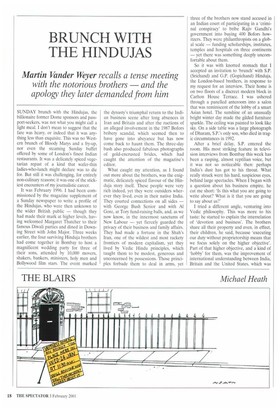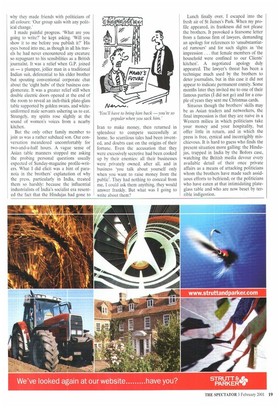BRUNCH WITH THE HINDUJAS
Martin Vander Weyer recalls a tense meeting
with the notorious brothers — and the apology they later demanded from him
SUNDAY brunch with the Hindujas, the billionaire former Dome sponsors and passport-seekers, was not what you might call a light meal. I don't mean to suggest that the fare was heavy, or indeed that it was anything less than exquisite. This was no Western brunch of Bloody Marys and a fry-up, nor even the steaming Sunday buffet offered by some of London's finest Indian restaurants. It was a delicately spiced vegetarian repast of a kind that wafer-thin ladies-who-lunch might declare was to die for. But still it was challenging, for entirely non-culinary reasons; it was one of the stickiest encounters of my journalistic career.
It was February 1996. I had been commissioned by the magazine supplement of a Sunday newspaper to write a profile of the Hindujas, who were then unknown to the wider British public — though they had made their mark at higher levels, having welcomed Margaret Thatcher to their famous Diwali parties and dined in Downing Street with John Major. Three weeks earlier, the four surviving Hinduja brothers had come together in Bombay to host a magnificent wedding party for three of their sons, attended by 10,000 movers, shakers, bankers, ministers, holy men and Bollywood film stars. The event marked the dynasty's triumphal return to the Indian business scene after long absences in Iran and Britain and after the ructions of an alleged involvement in the 1987 Bofors bribery scandal, which seemed then to have gone into abeyance but has now come back to haunt them. The three-day bash also produced fabulous photographs of gold-encrusted brides, which had caught the attention of the magazine's editor.
What caught my attention, as I found out more about the brothers, was the enigmatic, delicately spiced flavour of the Hinduja story itself. These people were very rich indeed, yet they were outsiders wherever they lived, even in their native India. They courted connections on all sides — with George Bush Senior and with Al Gore, at Tory fund-raising balls, and, as we now know, in the innermost sanctums of New Labour — yet fiercely guarded the privacy of their business and family affairs. They had made a fortune in the Shah's Iran, one of the wildest and most rackety frontiers of modern capitalism, yet they lived by Vedic Hindu principles, which taught them to be modest, generous and unconcerned by possessions. Those principles forbade them to deal in arms, yet three of the brothers now stand accused in an Indian court of participating in a 'criminal conspiracy' to bribe Rajiv Gandhi's government into buying 400 Bofors howitzers. They were philanthropists on a global scale — funding scholarships, institutes, temples and hospitals on three continents — yet there was something deeply uncomfortable about them.
So it was with knotted stomach that I accepted an invitation to 'brunch' with S.P. (Srichand) and G.P. (Gopichand) Hinduja, the London-based brothers, in response to my request for an interview. Their home is on two floors of a discreet modern block in Carlton House Terrace. I was ushered through a panelled anteroom into a salon that was reminiscent of the lobby of a smart Asian hotel. The sunshine of an unusually bright winter day made the gilded furniture sparkle. The ceiling was painted to look like sky. On a side table was a large photograph of Dharatn, S.P.'s only son, who died in tragic circumstances in 1992.
After a brief delay, S.P. entered the room. His most striking feature in television interviews from Bombay this week has been a rasping, almost reptilian voice, but it was not so noticeable then: perhaps India's dust has got to his throat. What really struck were his hard, suspicious eyes, behind large spectacles. When I began with a question about his business empire, he Cut me short: 'Is this what you are going to write about? What is it that you are going to say about us?'
I tried a different angle, venturing into Vedic philosophy. This was more to his taste: he started to explain the interrelation of 'devotion and business'. The brothers share all their property and even, in effect, their children, he said, because 'executing our duty without proprietorship means that we focus solely on the higher objective'. Part of that higher objective, and a kind of 'hobby' for them, was the improvement of international understanding between India, Britain and the United States, which was why they made friends with politicians of all colours: 'Our group sails with any political change.'
I made painful progress. 'What are you going to write?' he kept asking. Will you show it to me before you publish it?' His eyes bored into me, as though in all his travels he had never encountered any creature so repugnant to his sensibilities as a British journalist. It was a relief when G.P. joined us — a plumper, jollier man in a traditional Indian suit, deferential to his elder brother but spouting conventional corporate chat about the 'eight hubs' of their business conglomerate. It was a greater relief still when double electric doors opened at the end of the room to reveal an inch-thick plate-glass table supported by golden swans, and whiteuniformed male servants ushering us to eat. Strangely, my spirits rose slightly at the sound of women's voices from a nearby kitchen.
But the only other family member to join us was a rather subdued son. Our conversation meandered uncomfortably for two-and-a-half hours. A vague sense of Asian table manners stopped me asking the probing personal questions usually expected of Sunday-magazine profile-writers. What I did elicit was a hint of paranoia in the brothers' explanation of why the press, particularly in India, treated them so harshly: because the influential industrialists of India's socialist era resented the fact that the Hindujas had gone to Iran to make money, then returned in splendour to compete successfully at home. So scurrilous tales had been invented, and doubts cast on the origins of their fortune. Even the accusation that they were excessively secretive had been cooked up by their enemies: all their businesses were privately owned, after all, and in business 'you talk about yourself only when you want to raise money from the public'. They had nothing to conceal from me, I could ask them anything, they would answer frankly. But what was I going to write about them?
Lunch finally over, I escaped into the fresh air of St James's Park. When my profile appeared, its frankness did not please the brothers. It provoked a fearsome letter from a famous firm of lawyers, demanding an apology for references to 'unsubstantiated rumours' and for such slights as 'the impression • that female members of the household were confined to our Clients' kitchen'. A negotiated apology duly appeared. The lawyer's threat has been a technique much used by the brothers to deter journalists, but in this case it did not appear to indicate permanent enmity. Some months later they invited me to one of their famous parties (I did not go) and for a couple of years they sent me Christmas cards.
• Sinuous though the brothers' skills may be as Asian traders and networkers, the final impression is that they are naive in a Western milieu in which politicians take your money and your hospitality, but offer little in return, and in which the press is free, cynical and incorrigibly mischievous. It is hard to guess who finds the present situation more galling: the Hindujas, trapped in India by the Bofors case, watching the British media devour every available detail of their once private affairs as a means of attacking politicians whom the brothers have made such assiduous efforts to befriend; or the politicians who have eaten at that intimidating plateglass table and who are now beset by terrible indigestion.



























































 Previous page
Previous page